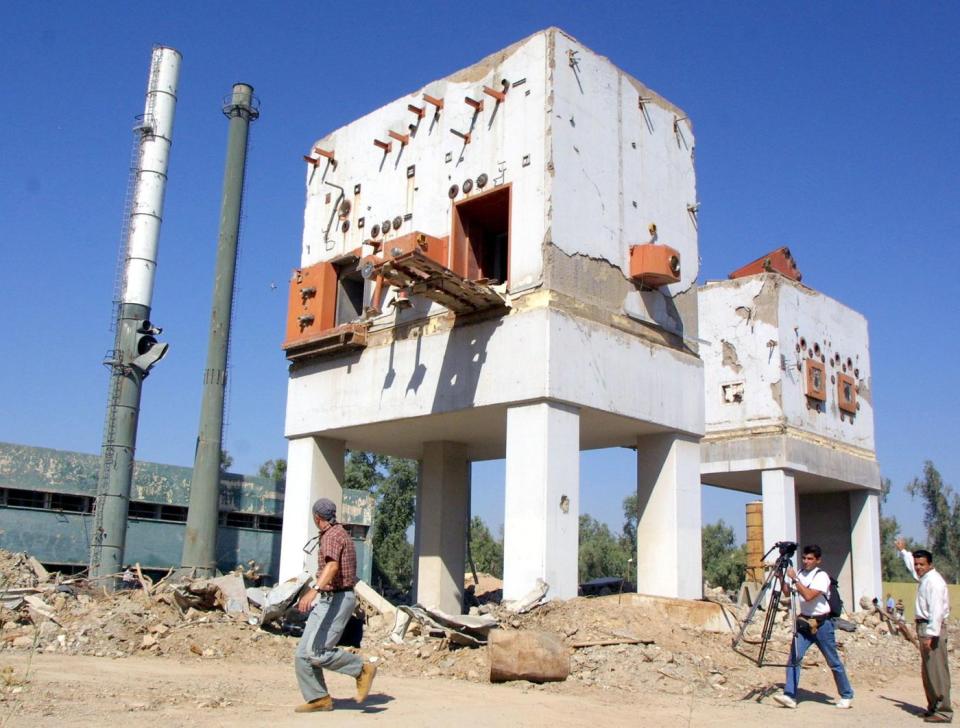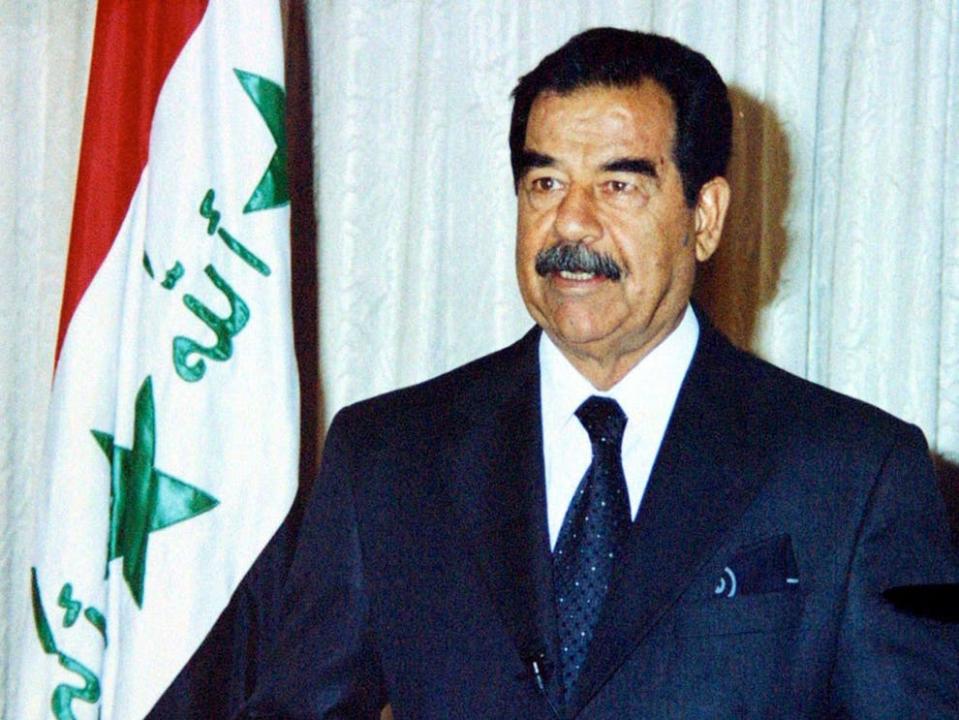Israel’s 1981 bombing of Iraq nuclear reactor may have fuelled Saddam’s nuclear ambitions

The remnants of Iraq’s Osirak nuclear reactor, 17km southeast of Baghdad, which was bombed on 7 June 1981
(Ramzi Haidar/AFP/Getty)Four decades ago, a squadron of Israeli fighter jets on a secret mission snuck over Saudi Arabian airspace and swooped in to destroy an Iraqi nuclear reactor site that was being built by French and Italian engineers just outside Baghdad. It was a surprise attack lauded by Israel’s defenders and cited as an example of effective derring-do, showing how raw military power could serve as a tool of arms control.
But a trove of previously secret United States documents released on Monday by a Washington organisation strongly suggests that Iraq’s nuclear ambitions had already been secretly contained by the Europeans who were building the bombed research reactor at Osirak. Moreover, the 7 June 1981 attack may have actually encouraged then Iraqi ruler Saddam Hussein to step up his quest for weapons of mass destruction.
The documents, obtained by the Washington-based National Security Archive through Freedom of Information Act requests, include White House, State Department and CIA cables which summarise key diplomatic and political interactions that preceded the attack. They also show attempts by US officials to grapple with the aftermath.
At least 10 Iraqi soldiers and a French civilian were killed in the Israeli attack.
The documents, retrieved and published as part of a transparency advocacy project hosted by George Washington University, are being released at a time when Israel is attempting to rally nations against the nuclear programme of Iran.
For weeks in Vienna, the US and other world powers have been trying to resurrect a nuclear non-proliferation deal with Iran that was sabotaged by former US president Donald Trump. Israel opposes a return to the deal.
France had long insisted that the design for the nuclear plant it was building made it impossible to retrofit to produce fissile material for a bomb. But one highly sensitive document in the trove says Paris had gone even further.
It recounts for the first time a 25 July 1980 Paris meeting between US diplomats and a senior French non-proliferation official – who insisted on absolute secrecy – about Iraq-bound shipments of uranium.
The official said the materials had been secretly chemically altered to make them useless for weapons use.
“He stressed the precautions they have and are taking,” the State Department cable says. “They find themselves in a dilemma, however, as they are unable to describe some of the precautions they are taking, in view of the fact that the Iraqis themselves were unaware of some of the preventative measures which the French are taking.”
The main step the French had taken was to pre-irradiate any enriched uranium it would send to Iraq, making it “not usable as a weapons material,” says the document.
Other less controversial precautions included allowing only one shipment of uranium into the reactor at a time, maintaining a French presence at Osirak at all times, and making sure French technicians monitored the enriched uranium as they were being transported
But one document marked secret suggests there were concerns that Italian and French contractors were competing to sell weapons to Iraq. There were worries that Italy in particular would try to sweeten any deal by including advanced nuclear technology as part of its offerings.
Days after the Iran-Iraq war began, Iraqi armed forces swarmed into the Osirak site, adding more worries about Baghdad’s ultimate intentions.
“Are French officials still at the site and do they have access to the fuel there? What is the status of the fuel?” an 11 October 1980 US State Department cable from Washington to Paris demanded.
Other documents point to worries by US officials that Iraq was scouring the globe for sensitive nuclear material.
On 20 January 1981, a new administration took over in Washington under President Ronald Reagan. There is a gap in the documents that may suggest that the new administration failed to grasp the urgency of the matter and stakes involved.
The documents show how concerned US officials at the time were not only about Iraqi weapons pursuits, but also the possibility that Israel could provoke a wider war by attacking Osirak. At the time, the US was considered far more of a neutral arbiter between Israel and Arab states than it is now. Saudi officials told Americans they were enraged that Israel had used its territory to reach Iraq, with Israeli pilots falsely signalling they were Jordanian.
One Saudi official whose name was redacted told a US counterpart, “this is one of the most dangerous situations Saudi Arabia has ever faced. It is an insult to both Saudi Arabia and the US and puts the Saudis in an embarrassing situation vis-a-vis other Arabs,” according to the minutes of a White House meeting obtained by the National Security Archive.
Washington demanded answers from Israel about specific intelligence it had that weapons work was being conducted in Osirak, but Israel only responded with vague worst-case scenarios, according to a National Security Council document. US officials could find no evidence of claims by Israelis of a “secret bunker” beneath Osirak that was to be used for weapons work.
Reagan reacted to the attack harshly at first, suspending some arms sales to Israel and cooperating with Iraq in crafting a UN condemnation.

But other officials pushed back. One memo prepared for the president by neo-conservative White House official Douglas Feith, who 22 years later emerged as one of the key architects of the 2003 US invasion of Iraq, blamed Reagan’s predecessor Jimmy Carter for the crisis and urged the administration not to criticise Israel’s then-prime minister Menachem Begin.
“Your public statements must be framed with the raid’s diplomatic background lest they unduly antogonise Israel,” it says.
Iraq, a signatory to the Non-Proliferation Treaty, was obliged to open its nuclear facilities to inspection by the International Atomic Energy Agency. But the Israeli attack on Osirak, along with the ongoing war then raging between Iran and Iraq, ended Iraqi cooperation with European nuclear firms, driving the programme underground.
A classified assessment by the State Department’s intelligence branch said that while the attack on Osirak may have set back Iraq’s nuclear programme, it may have done more harm than good, accurately predicting a years-long attempt by Iraq to evade inspectors and pursue weapons of mass destruction. International inspectors were shocked a decade later by Iraq’s secret nuclear and chemical weapons advances following the 1991 US-led Gulf War.
“The bombing set back temporarily Iraq’s nuclear research program, which aimed for a weapons option, by limiting its access to material and technological assistance,” said the 17 August 1981 assessment.
“The raid may, however, have heightened Iraq’s interest in eventually acquiring a nuclear weapons capability.”
Read More
Work on Greek migrant camp yet to begin 9 months after fire

 Yahoo Finance
Yahoo Finance 